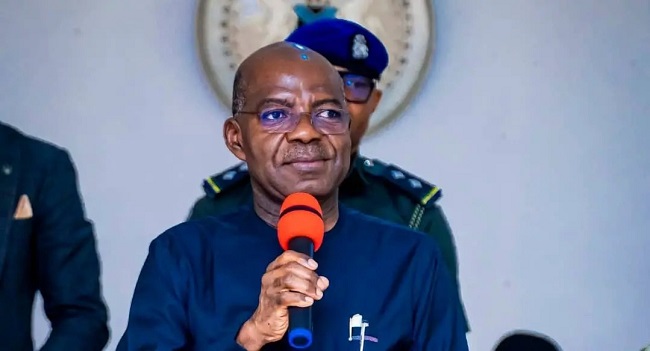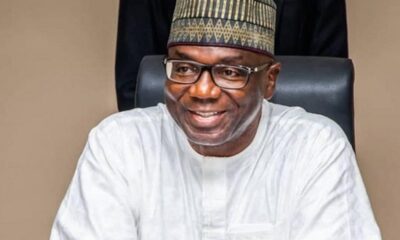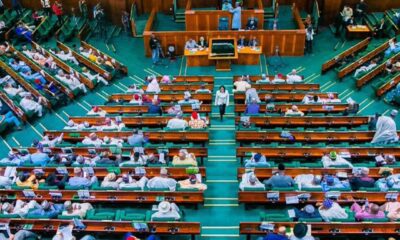News
UTME: National Assembly backs 18 years university admission age

The National Assembly says it will come up with a robust legislation to support 18 years old as entry limit for admission into tertiary educational institutions.
The Chairman, Senate Committee on tertiary institutions and TETFund, Sen. Muntari Dandutse, said this at the ongoing monitoring of the 2024 Unified Tertiary Matriculation Examinations (UTME) in Abuja on Tuesday.
The Katsina South senator was accompanied on the visit by other members of his committee as well as his counterparts from the Committee on Higher Education in the House of Representatives.
Dandutse said though age should not be a barrier to tertiary educational institutions, but the age limit of 18 years as proposed by the Minister of Education is sacrosanct.
His counterpart, Sen. Sunday Karimi, representing Kogi West, said there had been a law mandating admission to be given to candidates who are 18 years old.
According to him, the law has been there but with what is happening, “we are going to amend it and make it robust.”
“Specifically, everybody should have access to education, your age either 40 or 50 or 60 years doesn’t mean you cannot enter the university.
“Age should not be a barrier but there is also an age limit and minimum, you cannot be 12, 13, 14 years and enter into the university.
“Before you can enter primary school, you have to be six years, before you can enter secondary school, you have to be 12 years, so before you can enter the university, you have to be 18 years,” Karimi said.
The Minister of Education, Prof. Tahir Mamman had earlier given a directive that admission into tertiary institutions should not be given to candidates less than 18 years.
He decried the activities of some parents, who were pressuring their underage students to get admissions into tertiary institutions.
The minister said that the 18-year benchmark is in line with the 6-3-3-4 system of education.
News
Forensic Audit seeks return of stolen government funds, not a witch-hunt – Gov Otti


Gov. Alex Otti of Abia has said that he initiated a forensic audit of the State Government’s account to recover stolen government funds and not to witch-hunt anyone.
Otti said this on Sunday during an interactive session with constituents of Isiala Ngwa South State Constituency, in Nvosi, Isiala Ngwa South Local Government Area.
The governor said that upon assumption of office as governor, he established an audit with the primary objective of recovering stolen government funds and not to send anyone to jail.
He said that the report of the audit revealed that “a lot of money was looted and stolen brazenly” for non-existing projects which include the Abia Airport Project.
“I am looking for the airport for which funds were moved from the coffers of the government for.
“The people concerned with the act of moving the airport project funds in question went to the media and began to say all manner of things.
“If you are following the happenings in the media space, you will see these things there.
“The problem with lying is that when you tell one lie, you will need another one to cover the first lie and need three more lies to cover the second one.
“We are looking for our money and we must find our money.
“If we don’t find the airport, then they will refund our money,” he added.
According to him, the government will not relent in improving the welfare of the citizenry through various progressive initiatives that facilitate socioeconomic growth.
He said that the government was determined to recover the funds and utilise it for the development of the state.
Otti commended the House of Assembly member representing Isiala Ngwa South State Constituency, Mr Roland Chinwendu, for playing “politics of no bitterness”.
“Immediately, after the elections he came to me to make it clear that as the member representing my Constituency, he would work with me to move Abia forward.
“It is worthy of note that he is a member of the Peoples Democratic Party and I commend him for that,” he said.
Earlier, Chinwendu said that the emergence of Otti as the governor was an indication that the citizens desire good governance.
“The elections are long over and I was elected to deliver effective representation and not elected to play politics of opposition or bitterness.
“We have a governor whose dictum is practical government and good governance and I have no reason not to identify with him,” he said.
He assured the governor of the unalloyed support of his constituents and urged him to extend his infrastructural development to every part of the constituency.
Also, a Chieftain of the Labour Party, Senator Darlington Nwokocha, commended the lawmaker for reaching beyond party affiliations to support the Labour Party-led government in Abia.
He said that the present administration was poised to reposition the state through governance.
In an interview, Mr Henry Ori, Leader of the Ebubedike Movement for PDP in Nvosi Ward 5, said that the programmes and policies of the present administration were development-oriented.
“It is for this reason that we are here to show solidarity and support as well as encourage the governor to sustain the good works,” Ori said.
News
Aliko Dangote Foundation tasks faith leaders on malnutrition, hunger in Nigeria


The Aliko Dangote Foundation (ADF) has underscored the pivotal role of religious and traditional institutions in tackling the pressing issues of malnutrition and hunger within Nigeria. Speaking at an event organised by the National Council on Nutrition and the World Bank-Assisted Accelerating Nutrition Results in Nigeria Project, Mrs. Zouera Youssoufou, the Managing Director/Chief Executive Officer of Aliko Dangote Foundation, emphasised the significance of faith-based groups in the national agenda for improving nutrition and human capital development in Nigeria.
During the high-level dialogue on nutrition at the Presidential Villa in Abuja, themed ‘Faith Leaders as Catalysts for Enhanced Human Capital Through Nutrition,’ Mrs. Youssoufou highlighted that nutrition goes beyond mere sustenance; it is about nurturing the body, mind, and spirit. She emphasised that adequate nutrition forms the cornerstone of human capital development.
Mrs. Youssoufou painted a grim picture of the situation in Nigeria, where malnutrition significantly hampers the nation’s progress. She pointed out that children are particularly vulnerable, suffering from stunted growth, cognitive impairments, and increased susceptibility to diseases due to inadequate nutrition.
She stressed that malnutrition’s consequences extend beyond physical health to affect educational achievements, economic productivity, and overall well-being. Urgent and concerted action from all sectors of society is imperative to address this crisis.
Mrs. Youssoufou highlighted the unique position of faith leaders, with their grassroots reach and influence, in driving positive change in nutrition.
She said their teachings on compassion, justice, and stewardship can inspire individuals to prioritise good nutrition, support vulnerable populations, and advocate for policies promoting food security.
By leveraging the collective power of faith communities, Mrs. Youssoufou proposed fostering a culture of health and wellness that values nutritious diets, breastfeeding, and access to essential nutrients. She suggested educational programs, awareness campaigns, and community engagement to empower individuals to make informed dietary choices.
Moreover, she emphasised the role of faith leaders as advocates for policy changes to address systemic barriers to good nutrition, such as food insecurity and inequitable access to healthcare services.
She added that by advocating for greater investment in nutrition-sensitive programs, they can create an enabling environment for improving health outcomes nationwide.
The dialogue aimed to facilitate the sharing of insights, best practices, and innovative solutions among faith leaders to drive progress in nutrition and human capital enhancement in Nigeria.
It called for unity transcending religious divides to work towards a healthier, more prosperous nation.
The host of the event, Vice President Kashim Shettima, stressed the indispensable role of faith and traditional leaders in improving nutrition within their communities.
“Your influence is indispensable. We believe that, regardless of the quality of ideas we bring to the table, our efforts will fall short without your participation and endorsement,” he said.
The VP stressed that Nigeria’s future readiness hinges not just on food abundance but on the nourishing quality of its food supply.
“We must proclaim to the world that our commitment to producing food of unparalleled richness is not rhetoric,” Shettima declared, noting that “this gathering is a solemn pledge to safeguard our well-being and preserve the legacy of generations yet to come.”
He restated President Bola Tinubu’s commitment to prioritizing nutrition as part of Nigeria’s food security drive.
Earlier, the Minister of Budget and Economic Planning, Atiku Bagudu, said malnutrition and related challenges have over the years negatively impacted human capital development, requiring accelerated interventions.
The Minister described the efforts and interventions of the National Economic Council (chaired by the Vice President) and the engagement with faith-based leaders as testimonies that Nigeria has the institutional mechanism to combat hunger and malnutrition with their associated challenges.
On his part, Coordinating Minister of Health and Social Welfare, Prof. Muhammad Pate, said the engagement with faith-based leaders was not just a dialogue but a clarion call for action to address one of society’s most disturbing challenges.
Prof. Pate called on religious and traditional leaders in Nigeria to leverage their network and influence in society to support the government in combating hunger and malnutrition, describing faith-based leaders as the backbone of their communities, hence their importance in improving the nutritional outcomes in their various domains.
The Sultan of Sokoto, Muhammadu Sa’ad Abubakar III, and the President of the Christian Association of Nigeria, Dr. Daniel Okoh, pledged the commitment of their communities and congregations to the efforts to combat hunger and malnutrition in the country, stating that their presence at the event underscored their loyalty to the campaign.
News
Shettima departs for 2024 US-Africa Business Summit in Dallas


Vice-President Kashim Shettima is expected to depart Abuja for Dallas, United States of America, to represent President Bola Tinubu at the 2024 US-Africa Business Summit.
The summit is organised by the Corporate Council on Africa.
Mr Stanley Nkwocha, the Senior Special Assistant to the President on Media and Communications, Office of The Vice-President, said this in a statement on Sunday in Abuja.
Nkwocha said Shettima would join other political and business leaders across Africa, the USA and beyond for the summit.
According to him, the summit will feature high-level dialogues, networking business sessions and the plenary, all scheduled for the Kay Bailey Hutchison Convention Center in Dallas, Texas.
He said that the African leaders expected at the summit include, the President, Republic of Liberia; Joseph Boakai, President, Republic of Malawi; Lazarus Chakwera and the President, Republic of Angola, Joao Lourenço.
Nkwocha said other African leaders that would grace the summit are the President, Republic of Botswana, Mokgweetsi E. K. Masisi, President, Republic of Cabo Verde, José Maria Neves, and the Deputy Prime Minister, Kingdom of Lesotho, Nthomeng Majara.
He said besides the summit’s plenary, Shettima would speak at the Roundtable on African Infrastructure Investment with a focus on impact and returns.
” He (Shettima) is also scheduled to speak on a high-level panel on agribusiness, focusing on transiting “from food insecurity to thriving agribusinesses.
” Additionally, the Vice-President will speak at a plenary session on Navigating Africa’s Energy Future as well as chair a session dedicated to promoting the ‘invest in Nigeria’ initiative.
” He is also expected to attend other meetings and engagements on the sideline of the summit.”
Nkwocha said that Vice-President Shettima is expected back in the country at the end of his engagements in the US.
-
capital market2 years ago
Rt.briscoe, FBNH, Others halts negative performance of stock market
-
Finance3 months ago
Court orders Sen. Victor Umeh to repay N136m bank debt to AMCON
-



 Abuja Update2 months ago
Abuja Update2 months agoUNDP, FG partnership needed to achieve inclusion, equity- Minister
-
Abuja Update1 month ago
Banks drive stock market performance with N147bn gain
-



 Business2 weeks ago
Business2 weeks agoTingo Group unveils Tingo Electric, Tingo Cola drink at Lagos launch
-



 Health3 weeks ago
Health3 weeks agoCapacity training will reduce migration of health workers- NPHCDA
-
News4 months ago
Oil thieves sponsoring malicious media campaign against Navy – Spokesman
-



 Infotech1 month ago
Infotech1 month agoWorld Backup Day: NITDA urges Nigerians to ensure backup of data














